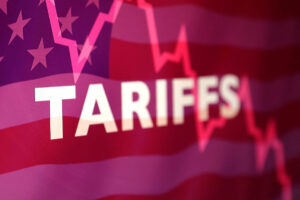President Donald Trump’s sweeping new tariffs on global imports — including a 10% charge on all UK goods — have triggered fears of a global trade war, with wide-ranging implications for UK consumers, investors and businesses.
While the UK’s tariff rate is lower than that faced by some countries, the knock-on effects could still be significant — from higher prices and rising inflation to weaker pensions, lower interest rates, and job losses in key sectors.
Will prices rise?
At this stage, the UK has not introduced retaliatory tariffs on US imports, meaning American goods entering the UK remain unaffected. However, if the UK were to respond in kind, prices for US goods could increase, especially for products with tight profit margins, where importers may pass on costs to consumers.
Some importers may choose to switch suppliers to countries unaffected by US tariffs, which could help keep prices down. If supply from alternative markets grows, prices could even fall in the short term, although such outcomes are highly uncertain.
There have been questions around the role of VAT in Trump’s trade complaint, but the UK government is unlikely to alter VAT rules in response — doing so could unfairly advantage US imports over domestic products.
Support authors and subscribe to content
This is premium stuff. Subscribe to read the entire article.











